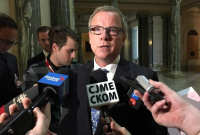Thank you for helping us meet our fundraising goal!
Saskatchewan Premier Brad Wall says he knew budget decisions were likely to hurt his party's popularity with voters and a new poll suggests just that.
Numbers from Mainstreet Research indicate that Wall's Saskatchewan Party dropped steeply in voter support while the New Democratic Party took a nine-point lead.
Wall, who has often ranked at or near the top in national surveys of the country's leaders, wrote on Facebook on Thursday that the poll "though not entirely consistent with our own research, certainly points to such a decline for our party."
The poll, done for the Saskatoon StarPhoenix and Regina Leader-Post, found that 49 per cent of decided and leaning voters preferred the New Democratic Party compared with 40 per cent for Wall's governing Saskatchewan Party.
David Valentin, executive vice-president of Mainstreet Research, said the numbers show "a sea change."
"These numbers with the NDP leading by nine percentage points across the province really are quite interesting, because we're seeing them do well — not just in Regina, not just in Saskatoon at the moment — but also outside those urban centres and that's the traditional territory and real strength of the Saskatchewan Party," Valentin said in an interview.
The poll of 2,000 Saskatchewan residents was done by landline and cellphone on May 15 and 16 and has a margin of error of plus or minus 2.19 percentage points, 19 times out of 20.
The NDP had 58 per cent of support among decided and leaning voters in Regina compared with 29 per cent for the Sask. Party. It was a little closer in Saskatoon, where the NDP was at 46 per cent support, while the Sask. Party was at 42 per cent.
Outside the urban centres of Regina and Saskatoon, the Sask. Party and NDP were tied at 46 per cent. Valentin said the numbers show the fallout from a widely criticized provincial budget released in March.
The budget cut library and education funding, as well as grants to municipalities, although cash for libraries was later restored. It raised the provincial sales tax and added it to things that were previously exempt, such as children's clothing and restaurant meals.
The government also shut down the provincial bus company to help tackle a $1.3-billion deficit.
"Maybe not everyone across the province is equally affected in a negative manner from this budget, but perception is sometimes much more important than actual reality," Valentin said. "People ... are beginning to perceive that the budget has serious flaws and the way that it was communicated was not appropriate."
Wall defended the budget in his Facebook post.
"I remain confident that we made the right decisions — difficult but necessary decisions — to ensure we see a significant improvement in the province's finances, Saskatchewan's economy and the future of every family across our great province," he wrote.
Wall has been premier for almost 10 years. Saskatchewan voters last went to the polls in April 2016, and Wall and his Saskatchewan Party resoundingly won a third term with 51 seats in the 61-seat legislature.
Valentin suggests that "with the information we have now, it's possible the NDP could form the next government with these numbers."
"Of course, there is no election today or tomorrow, and the NDP have yet to elect a permanent leader," he noted.
Cam Broten, Opposition NDP leader at the time, lost his seat in the last election. The NDP is to choose its next boss at a convention on May 6, 2018.
Valentin said the question is whether Wall will run again and, if he doesn't, who will lead the Saskatchewan Party into the next vote.
"So these results today are not indicative of what happens two, three years from now. But they are an indication of what people are feeling right now, today."




Comments